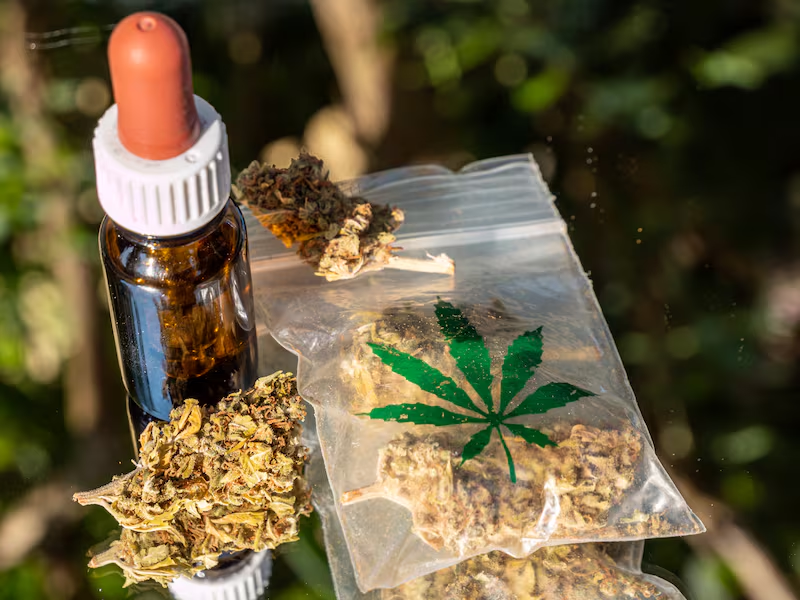Panama Patients Wonder Why Medicinal Cannabis is Still Not Available
Medicinal cannabis is not reaching patients because the registry remains inactive and the first products will be imported and expensive, warned Enma Pinzón, from the Federation of Chronic Diseases.

The implementation of medicinal cannabis in Panama has once again entered a phase of both anticipation and uncertainty among patients. Although the Ministry of Health (Minsa) announced modifications to the decree regulating Law 242 of October 13, 2021, on medicinal cannabis—including the future availability of the product in authorized pharmacies—patient organizations maintain a cautious stance. Among them is Enma Pinzón, from the National Federation of Associations of Chronic, Critical, and Degenerative Diseases.

Pinzón, a patient with rheumatic and musculoskeletal diseases, points out that medicinal cannabis is not a fad, but a therapeutic alternative supported by international scientific evidence. In her case, she says she has found significant relief without subjecting her body to the adverse effects of traditional medications such as non-steroidal anti-inflammatory drugs (NSAIDs). “Medicinal cannabis already has scientific evidence of its benefits in various diseases. For patients with rheumatic and musculoskeletal diseases, like myself, it provides relief from chronic pain, without the damage to organs, such as the kidneys, that NSAIDs can cause.” she said.
A Process That Remains Incomplete but is Moving Forward
The director of Pharmacies and Drugs at the Ministry of Health, Uriel Pérez, recently stated in a news interview that, with the modifications to the decree, the country is closer to seeing the first cannabis products on the shelves of authorized pharmacies. However the announcement does not cover all the necessary steps to guarantee real and safe access. When asked whether the process would actually move forward this time or if it might stall again, Pinzón made it clear that essential elements are still missing, since “the decree helps with the opening of pharmacies and the distribution of the product in them, however, we still have no news that the patient registration is enabled.”
Registration is a key component of regulation, as it allows for user identification, therapeutic monitoring, and prevention of product diversion. Its absence leaves patients in limbo: without registration, pharmacies cannot dispense the medication, and doctors cannot formalize prescriptions, even if the product arrives in the country. Patient registration is now the responsibility of the General Directorate of Health of the Ministry of Health.
Medical Training: A Point of Debate
Another change announced by the Ministry of Health was the elimination of the mandatory course that doctors had to take to be able to prescribe medicinal cannabis. With this adjustment, any authorized doctor will be able to issue a prescription. Although some sectors celebrate it as a step toward streamlining the system, Pinzón maintains that the measure should be analyzed with caution. “The fact that they are eliminating the requirement for doctors to undergo training doesn’t mean that those doctors who are interested in properly managing the medication will opt for the training; it’s up to us, the patients, to choose our doctors wisely,” she stated.
For Pinzón, the responsibility should not fall solely on the patient, but he acknowledges that, in practice, information and medical reputation will be key to receiving adequate treatment. The medicinal use of cannabis requires specific knowledge about dosage, drug interactions, mechanisms of action, and side effects. Voluntary training could create inequalities between those who have access to a trained physician and those who do not.
No closed list of diseases
Another important change was the elimination of the closed list of diseases for which the use of medicinal cannabis was permitted. This change was welcomed by Pinzón, who emphasized that science is dynamic and that maintaining a rigid list would be detrimental to the advancement of knowledge. “Eliminating the list helps because research always continues and it is possible that over time other diseases will be found where the product will work, and having a closed list hinders the patient’s access to the advancement of science,” he explained. For patients, this means that anyone with a clinically validated condition can be evaluated by their doctor to consider whether cannabis is a viable alternative, without relying on a list that could become outdated.
The Participation of Private Companies
According to the Ministry of Health (Minsa), five companies already have operating licenses and three have licenses for controlled substances, indicating that the production and logistics process is progressing. However, the companies must still apply for the necessary permits in the countries from which they will import the cannabis. Pinzón acknowledges the role of the private sector, but emphasizes that the ultimate responsibility for ensuring quality lies with the State, since “the Directorate of Pharmacies and Drugs already has regulations to enforce; it just needs to be implemented over time to ensure the quality and safety of the products that will be offered to patients.”
Availability and Prices
The national director of Pharmacies and Drugs assured that the products will be available “soon.” But for Pinzón, the real concern is not just the date, but the cost.
“The cannabis we will have access to is imported, and logically, it will be more expensive than that produced in Panama, and local production will take a few more years,” he warned. This means that, even as implementation progresses, the first patients could face high prices, limiting access for low-income individuals or those without private insurance. For patient organizations, the most essential element is still missing: a fully functional system. This includes an enabled registry, clear training, affordable pricing, and strict oversight. Pinzón sums up the feelings of many: real implementation is not yet guaranteed.
Enma Pinzón, Pictured Above, from the National Federation of Associations of Chronic Critical and Degenerative Diseases
The cannabis we will have access to is imported, and logically, it will be more expensive than that produced in Panama, and local production will take a few more years.





